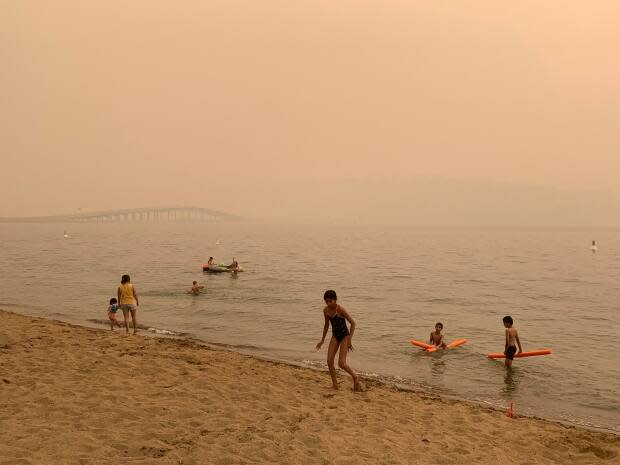Dry conditions expected to return after long weekend rain calmed wildfires in B.C. Interior

Precipitation and cooler temperatures over the weekend provided some relief for wildfire fighting efforts, but it wasn't enough to make much of a longterm dent, according to the B.C. Wildfire Service.
Dry conditions are expected to return to the southern Interior in the coming days.
The B.C. Wildfire Service's director of fire centre operations Rob Schweitzer said we're not in the clear yet — and he doesn't want anyone thinking the wildfires are over.
"It is only Aug. 3 and there's a lot of summer left," he said. "Everyone needs to remain diligent."
About 250 wildfires were burning in the province as of Tuesday afternoon, including the Sparks Lake wildfire north of Kamloops, which is currently 680 square kilometres in size.
That's just a fraction of the 5,560 square kilometres of land burned by more than 1,300 wildfires since the start of the fire season. The 10-year average for this time of year is about 760 wildfires, according to Schweitzer.
Schweitzer said there are about 3,300 personnel involved in wildfire fighting efforts and all available resources are being used.

Crews are focused on fighting fires that are impacting communities, and Schweitzer said some backcountry fires may keep burning until snow falls.
About 4,620 properties throughout B.C. have been ordered to evacuate, and another 21,000 remain on evacuation alert.
Provincial state of emergency extended
The B.C. government announced Tuesday that the provincial state of emergency declared July 20 will be extended through to the end of the day on Aug. 18.
"As we have seen over the past number of weeks, the continued dry, hot weather poses a high risk for potential wildfires," Minister of Public Safety and Solicitor General Mike Farnworth said in a press release.
"The province will continue to support British Columbians with all of the tools they may need if they end up facing an evacuation order."
Thick wildfire smoke lingers
Wildfire smoke is blanketing most of North America as wildfires burn throughout the continent.
That smoke has created visibility challenges for firefighters, meaning they've had to be strategic about where aircraft can operate.
Thick smoke lingering in B.C.'s Southern Interior has resulted in flight cancellations and delays going in and out of Kelowna and Kamloops.
A statement posted on Kelowna airport's website said a wildfire northwest of Vernon has moved toward Okanagan Lake and a no-fly zone was posted above the fire, impeding planes trying to land.
"We expect aircraft operations to restart service later this [Tuesday] afternoon, around 3.pm. We appreciate travellers' patience with this evolving situation," the airport's senior operations manager Phillip Elchitz said.
Elchitz reminded passengers to check their flights as air quality and airspace restrictions could still cause further delays or cancellations.

Because of the smoke, Kelowna winery Tantalus Vineyards has had to keep guests indoors when they would usually be outside on the patio, tasting wine and enjoying the views.
But people still came to visit the winery and explore its offerings indoors, communications manager Stephanie Mosley said, to escape the smoke and heat in the Okanagan.
"We were quite busy and the demand on our tasting room was high given the fact that people weren't getting to the beach; the [air quality] index was not healthy to be outside," she said.
However, the smoke eased on Tuesday, and Mosley said it was the clearest day they've seen in the past five days.
Air quality advisories are still in effect for much of B.C. but the advisory for Metro Vancouver was rescinded Tuesday.
Wildfire smoke can exacerbate chronic health conditions, including asthma, chronic obstructive pulmonary disease (COPD), heart disease and diabetes.
Provincial health officer Dr. Bonnie Henry says eye irritation, runny nose, sore throat and mild coughs are normal in the presence of smoke, and can be managed at home.
Anyone experiencing shortness of breath, chest pain, dizziness, severe cough or heart palpitations should seek medical attention.
Anyone placed under an evacuation order should leave the area immediately.
Evacuation centres have been set up throughout the province to assist anyone evacuating from a community under threat from a wildfire. To find the centre closest to you, visit the Emergency Management B.C. website.
Evacuees are encouraged to register with Emergency Support Services online, whether or not they access services at an evacuation centre.

